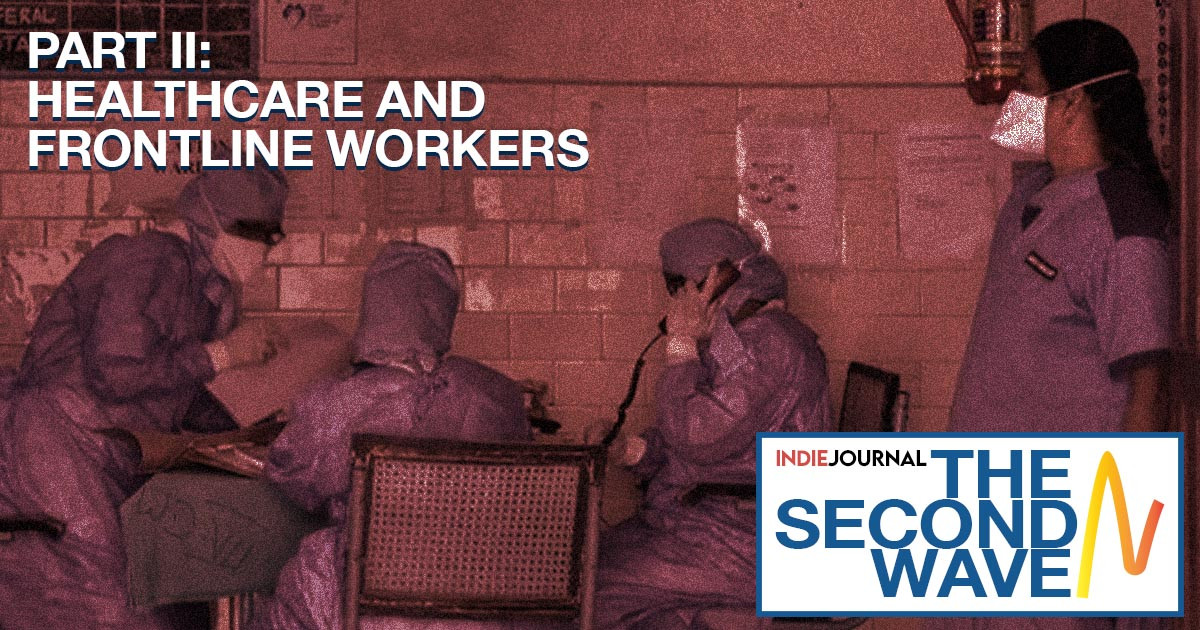India
The Second Wave: Medical staff ropewalks between caution and composure
To date, 240 new COVID strains have been identified in the country, as per experts.

With increasing Coronavirus cases across the country each day, the possibility of a second wave is being discussed and feared. To date, 240 new COVID strains have been identified in the country. AIIMS Delhi Director Dr Randeep Guleria has also warned that the rate of infection of the new strain identified in Maharashtra is quite high, and it could be more harmful. Guleria also said that the new strain could infect people who already have COVID-19 antibodies.
“Herd immunity is only good as a concept in India. For that to happen, around 80 percent of the people would need to have antibodies. This would be difficult considering the new COVID strain," Guleria said.
Speaking of herd immunity, he added, "These mutations or the new strains have become more resilient to treatment. So they could also infect people who have been vaccinated or have already developed antibodies."
With new strains being identified in different parts of the country, the rate of infection has also been observed to be increasing across the country, as well as in Maharashtra, said Dr Shashank Joshi of Maharashtra COVID Task Force.0000.
Dr Prakash Koyade who works as a medical officer at Yashwantrao Chavan Memorial (YCM) Hospital in Pimpri said, "In the last few days, we have been seeing 200-250 new cases coming in every day. This number was hardly around 60-70 a few weeks ago. If this continues, we will have no choice but to impose another lockdown. People stopped taking COVID-19 seriously, due to which we are in this situation." YCM Hospital had the least COVID mortality rate in the state during the peak period of the pandemic last year.
If people as well as medical professionals behave and work responsibly without believing in any rumours, we will be able to regain control over the prevailing COVID situation without having to impose a lockdown," Koyade added.
Gangadhar Ramtakke and Bhagyashri Nagare who are amongst the nursing staff at a government hospital in Mumbai said that the right strategy and positive response from the public had successfully contained the Coronavirus infections in the country last year. "It will soon be a year that the COVID-19 cases began in the state. The recovery rate of COVID patients had reached around 98 percent. However, the lockdown measures were relaxed, COVID infections re-emerged," they said. They also added that while they wouldn't call the experience of working during the COVID peak period 'bad', it was certainly challenging.
"There is no need to panic due to COVID-19. Many COVID patients admitted to our hospitals were scared. But we supported them through the treatment. However, the new strain is harmful, and taking all the precautions is the only way to combat it. We should be positive about fighting the disease and follow the protocol, without falling for rumours and misconceptions," nurse Sharayu Bhosekar told Indie Journal.
Instances of re-infection in India
In the last few days, the Indian Council of Medical Research (ICMR) has stated that they have come across three cases of COVID re-infection in November. ICMR Director Balram Bhargav had also stated that a recovered person still has chances of getting infected with COVID-19 within 100 days.
Maharashtra political leaders have also been reinfected with COVID-19 in the past few days. Maharashtra minister Bacchu Kadu, as well as NCP leader Eknath Khadse, have tested positive for COVID-19 for the second time.
Infection post vaccination
In Nagpur, five doctors reportedly tested positive for COVID despite getting vaccinated. Similarly, a nurse at Pune's Sassoon General Hospital is also known to have been re-infected, despite taking a COVID shot. However, responding to this, Dr Murlidhar Tambe, Dean at Sassoon General Hospital had said while speaking to the media that it was possible to get COVID infection after one shot of the vaccination. A similar instance was also observed in Nashik when a pharmacist in Nashik Civil Hospital had tested COVID positive after one COVID shot. Even in Amravati, 12 vaccinated health workers had contracted COVID. It has been stated by the experts that for the COVID vaccine to be completely effective, both shots need to be taken by the recipients.
Lack of health infrastructure
The inadequacy of health infrastructure has only fuelled the panic around COVID-19. Last year, there was news of insufficient availability of equipped beds at the hospitals, hospital bills were exorbitant. Some instances of mistreatment of COVID patients at the COVID centres were also reported. Due to this, many people, even with serious symptoms of COVID, were reported to hide their symptoms to avoid the ordeal of testing and treatment at the COVID hospitals.
"In Bhopal and surrounding areas, rumours that COVID was a myth were widespread. People stopped using masks or hand sanitisers. Many hospitals dismantled their COVID wards. People were irresponsible. The constantly changing government protocol added to the confusion," said a health officer from Bhopal on condition of anonymity.
Efficiency of antibodies
The first case of COVID re-infection was detected in Hong Kong. The patient contracted COVID again within four months of the first infection. Research has shown that the antibodies last for 60 to 80 days after recovery. Meanwhile, research conducted by Mumbai's JJ Hospital also showed that 90 percent of the recovered patients had 38.8 percent of the antibodies in three to five weeks of the infection.
A study by the Arizona University in the USA had also shown that if a COVID patient gets appropriate treatment, antibodies can last in their bodies for the next five months. The university had tested over 6,000 people for this study.





